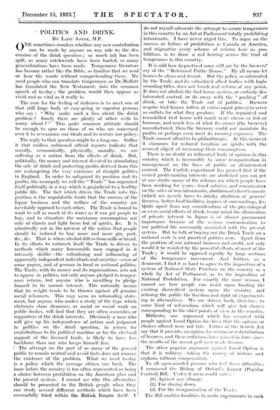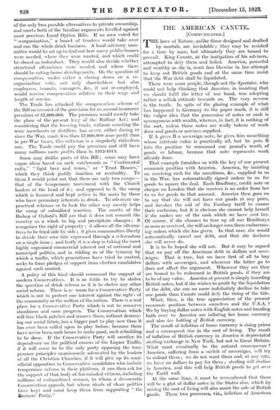• I'OLlTICS AND DRINK.
BY LADY ASTOR, M.P.
ONE sometimes wonders whether any new contribution can be made by anyone on any side to the dis- cussion of the drink question ; so much ink has been spilt, so many catchwords have been hurled, so many generalizations have been made. Temperance literature has become rather like the Bible, so familiar that we read or hear the words without comprehending them. We need people who can translate temperance, as Dr. Moffatt has translated the New Testament, into the common speech of to-day ; the problem would then appear as vivid and as vital as it really is.
The cure for the feeling of staleness is to meet one of that still large body of easy-going or superior persons who say : " Why make such a fuss about the drink problem ? Surely there arc plenty of other evils to worry about ? " This quite common attitude should he enough to spur on those of us who are concerned over it to re-examine our ideals and to restate our policy.
The reply to that question might be a long one. Suffice it that endless unbiassed official reports indicate that socially, economically, physically, morally, we arc suffering as a nation from the effects of drink. But, politically, the money and interest devoted to stimulating the sale of drink and protecting profits derived from this are endangering the very existence of straight politics in England. In order to safeguard its position and its profits, the monopoly we call the " Trade " has organized itself politically in a way which is prejudicial to a healthy public life. The fact which drives the Trade into this position is the unpalatable truth that the success of the liquor business and the welfare of the country arc inevitably opposed to each other. The Trade is bound to want to sell as much of its wares as it can get people to buy, and to stimulate the maximum consumption not only of clarets and light beers but of spirits, &c. It is admittedly not in the interest of the nation that people should be induced to buy more and more gin, port, &c., &e. That is where alcohol differs from milk or bread. In its efforts to entrench itself the Trade is driven to methods which many honourable men engaged in it intensely dislike—the subsidizing and influencing of apparently independent individuals and societies—even of some papers, and of persons in local or national politics. The Trade, with its money and its organizations, sets out to oppose in politics, not only anyone pledged to temper- ance reform, but anyone who is unwilling to pledge himself to its narrow interest. This naturally means that its weight tends to be thrown against all genuine social reformers. This may seem an astounding state- ment, but anyone who makes a study of the type which obstructs slum clearance, or social or moral work on public bodies, will find that they arc often associates or supporters of the drink interests. Obviously a man who will give up his independence of action and judgment in politics on the drink question, in return for contributions to his political machine or for the electoral support of the licensed trade, is likely to have less backbone than one who keeps himself free.
r The attempt on the part of so many of the general public to remain neutral and avoid facts does not remove the existence of the problem. What we need to-day is a policy which the average citizen can hack. The issue before the country is too often represented as being a choice between prohibition on the American plan and the present system. I cannot sec why this alternative should be presented to the British people when they can study several different methods which have been "successfully tried within the British Empire itself. I do not myself advocate the attempt to secure temperance far this country by an Act of Parliament totally prohibiting intoxicants. I have never urged this. To argue on the success or failure of prohibition in Canada or America, and stigmatize every scheme of reform here as pro- hibition, is to draw a red herring across the trail of temperance in this country.
It is odd how hypnotized some still arc by the brewers' cry of the " Reformed Public House." By all means let houses be clean and decent. But the policy as advocated by the Trade, and its subsidized allied bodies with high- sounding titles, does not touch real reform at any point.
It does not abolish the tied house system, or embody dis- interested control, or do away with the " pushing " of drink, or take the Trade out of polities. Brewers acquire tied houses (often at extravagant prices) to serve as outlets for what they produce. If the repainted and remodelled tied house sold much more cheese or fish or bananas, and much less of what its owner (the brewery) manufactured, then the brewery could not maintain its profits or perhaps even meet its running expenses. The Trade cannot afford to be philanthropic. At this moment it clamours for reduced taxation on spirits with the avowed object of increasing their consumption.
There is no doubt an influential body of opinion in this country which is favourable to some reorganization in management on the lines of public or disinterested control. The Carlisle experiment has proved that if the vested profit-making interests are abolished you can get at one stroke ninny of the reforms for which people have been working for years—fixed salaries, and commissions on the sales of non-intoxicants, abolition of advert isements (which are merely lures to drink), abolition of grocers licences, better food facilities, improved surroundings, &c. Quite apart from any consideration of the physiological or even social effects of drink, to my mind the elimination of private interest in liquor is of almost paramount importance because of the serious contamination to our political life necessarily associated with the present system. But to talk of buying out the Drink Trade on a national scale is not practical politics now. Apart from the position of our national finances and credit, not only would it be resisted by the powerful efforts of most of the Trade ; it would be opposed equally by large sections of the temperance movement. And further, as a democrat, I find it as hard to agree to the imposition of a system of National State Purchase on the country as a whole by Act of Parliament, as to the imposition of National Prohibition. For exactly the same reason, I cannot sec how people can insist upon binding the existing discredited system upon the country and refusing the public the freedom and right of experiment- ing in alternatives. We arc driven hack, therefore, to some kind of referendum which will give fair choices corresponding to the chief points of view in the country.
Hitherto, one argument has counted with people against Local Option has been that the options or choices offered were not fair. Critics of the Scotch Act say that it provides no option for reform or redistribution of licences, and these criticisms have gained in force sine:: the results of the recent poll were made known.
The other popular argument against Local Option is that it is robbery--taking the money of widows and orphans without compensation.
To all open-minded persons who feel these difficulties I commend the Bishop of Oxford's Liquor (Popular Control) Bill. Under it areas could vote : - (I) Against any change.
(2) For closing down.
(3) For the reorganization of the Trade. The Bill enables localities to make experiments in each of the only two possible alternatives to private ownership, and meets both of the familiar arguments levelled against most previous Local Option Bills. If an area voted for " reorganization," a board of trustees would take over and run the whole drink business. A local advisory com- mittee would be set up to find out how many public-houses were needed, where they were wanted, and which could be closed as-redundant. They would also decide whether structural alterations were needed, and where there should be eating-house developments. On the question of compensation, under either a closing down or a re- organization vote, not only shareholders but also employees, tenants, managers, &c., if not re-employed, would receive compensation relative to their wage and length of service.
The Trade has attacked the compensation scheme of the Bill on account of the provision for an annual insurance premium of £1,000,000. The premium would merely take the place of the present levy of the Balfour Act ; and considering that the brewing trade, without counting the wine merchants or distillers, has never, either during or since the War, made less than £7,000,000 more profit than in prc-War times, this criticism is a singularly ridiculous one. The Trade could pay the premium and still have many millions more profits than in 1913-1914.
Some may dislike parts of this Bill ; some may have vague ideas based on such catchwords as " Continental cafes," " light beer and wines," or " Trust Houses," which they think justify inaction or neutrality. To them I would point out that there are only two camps— that of the temperance movement with the Church leaders at the head of it ; and opposed to it, the camp which is financed and kept active in the main by those who have pecuniary interests in drink. To advocate un- practical schemes or to look the other way merely helps the camp of subsidized reaction. The merits of the Bishop of Oxford's Bill are that it does not commit the country as a whole to big and precipitate changes ; it recognizes the right of property ; it allows all the alterna- tives to be tried side by side ; it gives communities liberty to decide their own fate expressed through a referendum on a single issue ; and lastly it is a step in taking the most highly organized commercial interest out of national and municipal politics, and in ridding us of the tyranny by which a traffic, which generations have tried to control, seeks to force pledges of support from election candidates against such control.
A policy of this kind should command the support of modern Conservatives. It is as futile to try to shelve the question of drink reform as it is to shelve any other social reform. There is ne room for a Conservative Party which is out to protect one interest against the right--; of the community or the welfare of the nation. There is a real place for a Conservative Party which is out to conserve steadiness and sane progress. The Conservatism which will face black patches and remove them, without destroy- ing our social fabric, has a bigger part to play now than it has ever been called upon to play before, because there have never been such losses to make good, such rebuilding to be done. If the Conservative Party will sacrifice its dependence on the political caucus of the Liquor Traffic, if it will cease to be the only party opposing the tem- perance principles unanimously advocated by the leaders of all the Christian Churches, if it will give up its semi- official opposition to Conservative candidates who include temperance reform in their platform, it can then ask for the support of that body of fair-minded citizens, including millions of enfranchised women, to whom a democratic Conservatism appeals, but whose ideals of clean politics have kept and must keep them from supporting " the Brewers' Party."



















































 Previous page
Previous page